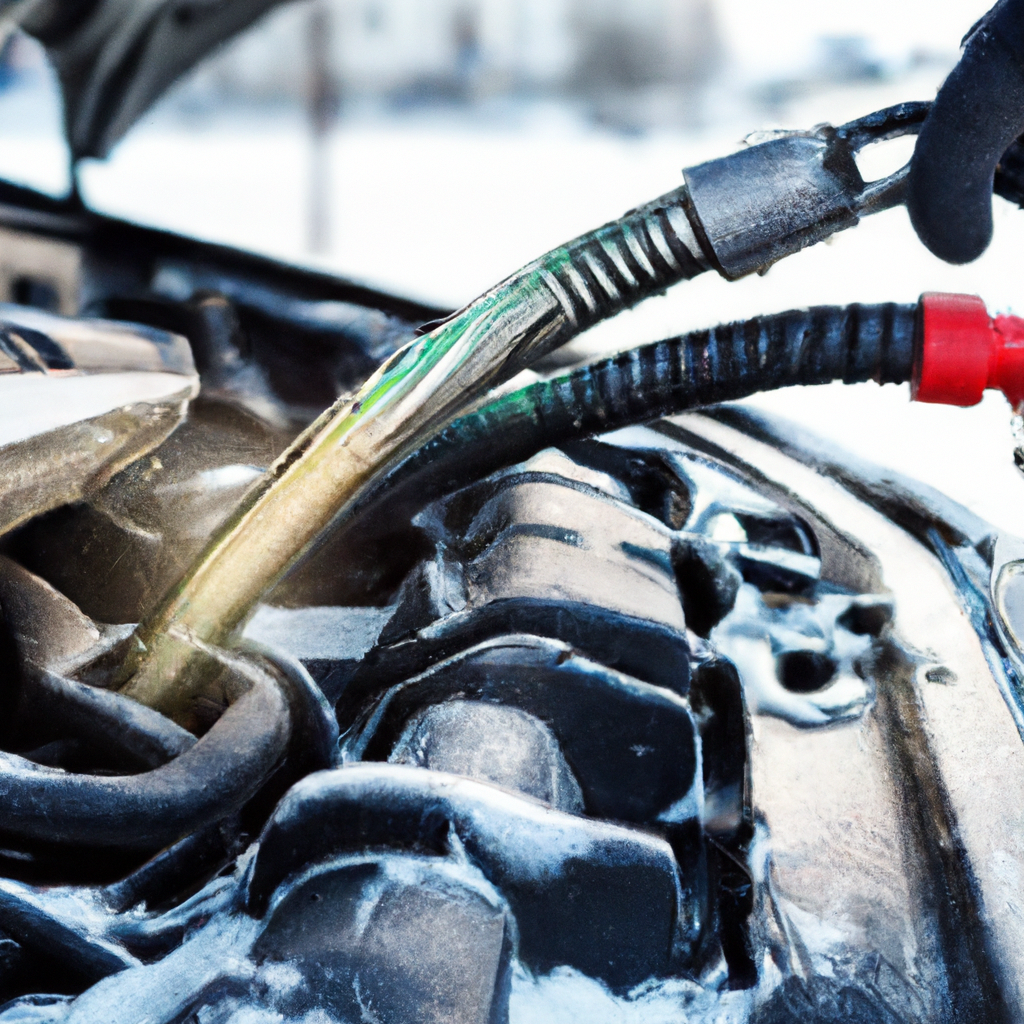Have you ever wondered why diesel trucks require you to plug them in? It’s a question that many auto enthusiasts have pondered, and the answer lies in the unique properties of diesel fuel. Unlike gasoline, which is highly volatile and easily combustible, diesel fuel needs something extra to help it ignite in colder temperatures. That something extra is a block heater, which is used to warm up the engine before starting. In this article, we will explore the reasons behind why diesel trucks need to be plugged in and the benefits it brings to the vehicle’s performance. So, get ready to uncover the fascinating world of diesel engines and the role of plugging in.


Overview
Introduction to diesel trucks
If you own a diesel truck, you know just how powerful and reliable these vehicles can be. Diesel trucks are equipped with engines that use compression ignition to generate power, offering great torque and fuel efficiency. These trucks can handle heavy loads, making them a popular choice for towing, hauling, and other demanding tasks. However, diesel engines face unique challenges when it comes to cold weather. That’s where plugging in comes in.
Importance of plugging in
During colder seasons, diesel engines can struggle with starting and performance. The cold weather affects the viscosity of diesel fuel, making it thicker and harder to ignite. Additionally, lower temperatures decrease the efficiency of the battery, making it more challenging to crank the engine. To overcome these challenges, plugging in your diesel truck is crucial. By connecting your truck to an external power source, you can improve cold starting and ensure optimal performance, even in freezing temperatures.
Understanding the need for external power
Diesel engines require external power sources because of their unique properties. Unlike gasoline engines that rely solely on spark plugs for ignition, diesel engines rely on compression to ignite the fuel-air mixture. However, this compression alone might not be sufficient in extremely cold temperatures. Plugging in provides the additional heat required to facilitate combustion, ensuring a smoother start and better overall performance. Now, let’s delve deeper into the various aspects of a diesel truck engine and how they are affected by cold weather.
Diesel Truck Engine
Working principle of a diesel engine
Before we dive into the impacts of cold weather on diesel engines, let’s briefly understand the working principle of a diesel engine. Diesel engines operate on the principle of compression ignition. They compress a mixture of fuel and air within the combustion chamber, raising the temperature. When this mixture reaches a certain temperature, the fuel self-ignites due to the high compression, generating power that drives the engine.
Key components of a diesel engine
Diesel engines consist of several crucial components that contribute to their efficient operation. The cylinder block houses the cylinders where combustion occurs. Pistons move up and down in these cylinders, providing the mechanical force required to power the engine. The fuel injection system delivers fuel into the combustion chambers, with precision timing and pressure. Additionally, the air intake system, cooling system, and exhaust system all play vital roles in supporting the engine’s performance.
Fuel injection system in diesel engines
The fuel injection system is a critical component of any diesel engine. It ensures precise fuel delivery to optimize combustion and power output. In cold weather, the fuel injection system faces challenges due to the increased viscosity of diesel fuel. The colder the temperature, the thicker the fuel becomes, making it harder to atomize and mix properly with the air. This can lead to incomplete combustion, reduced power, and increased emissions. Plugging in the engine helps to warm the fuel and improve its flow, mitigating these issues.
Cold Weather Challenges
Impacts of cold weather on diesel engines
Cold weather can pose various challenges for diesel engines. The most notable impact is the increased viscosity of diesel fuel at lower temperatures. As the fuel thickens, it becomes more difficult to atomize and ignite. This can result in delayed or incomplete combustion, leading to reduced power, rough idling, white smoke, and increased emissions. Furthermore, cold weather affects battery performance, making it harder to crank the engine. Plugging in addresses these challenges and ensures smoother starting and optimal engine operation.
Effects of low temperatures on engine starting and performance
When the temperature drops, a diesel engine’s starting and performance can be significantly affected. Cold temperatures hamper the compression ignition process, requiring additional heat to reach the required temperature for proper fuel combustion. Without adequate heat, the fuel-air mixture may not ignite promptly, leading to extended cranking times or the engine outright failing to start. Furthermore, cold weather increases engine friction, reducing overall efficiency and power output. Plugging in your diesel truck mitigates these effects, allowing the engine to start smoothly and perform at its best.
Glow Plug System
What is a glow plug?
The glow plug is an essential component of a diesel engine’s ignition system. It resembles a spark plug but functions differently. Instead of producing a spark, a glow plug uses electrical resistance to generate intense heat. This heat warms the air inside the combustion chambers, ensuring the fuel is at the ideal temperature for combustion.
Purpose and function of glow plugs
The primary purpose of glow plugs is to aid in cold starting. By preheating the air inside the cylinders, glow plugs assist in reaching the necessary temperature for fuel ignition. They reduce the strain on the battery and starter motor, making the starting process more efficient and reliable. Once the engine is running, glow plugs continue to operate for a short period, promoting stable and smooth combustion.
How glow plugs improve cold starting
In cold weather, glow plugs play a crucial role in facilitating cold starting. When you turn the key, the glow plug system activates, heating up the combustion chambers. This preheating process ensures that the air and fuel mixture is warm enough to ignite properly. By using less battery power than extended cranking, glow plugs help conserve energy and improve starting reliability. Plugging in your diesel truck allows the glow plugs to reach the optimal operating temperature and significantly enhance cold starting performance.


Block Heater
Role of a block heater
A block heater is an external device that helps warm the engine block before starting. It is typically connected to a power outlet and acts as a preheater for the engine coolant. By keeping the engine block and coolant warm, a block heater enables the engine to start more easily, even in freezing temperatures.
Benefits of using a block heater in cold weather
Using a block heater offers numerous benefits for diesel truck owners in cold weather. The most significant advantage is improved cold starting performance. By maintaining a warmer engine block, the block heater assists in vaporizing the fuel and promoting efficient combustion. This results in smoother and faster starts, reduced wear and tear on the engine, and lower emissions. Additionally, a warmed engine reaches its optimal operating temperature faster, providing better fuel efficiency and overall performance.
How a block heater works
Block heaters are typically installed in the engine block or the coolant system. The heater element is designed to warm the coolant, which, in turn, warms the engine block and other vital components. As the block heater draws power from an external source, it slowly raises the temperature of the coolant and the surrounding engine parts. This warm-up process ensures that the diesel fuel remains at an optimal temperature for ignition, greatly improving starting and overall engine performance in cold weather.
Cold Cranking Amps (CCA)
Definition of CCA
Cold Cranking Amps (CCA) is a unit of measurement used to determine a battery’s ability to start an engine in cold temperatures. It refers to the maximum current a battery can deliver for 30 seconds while maintaining a voltage of at least 7.2 volts.
Importance of CCA for diesel engines
Diesel engines require higher cranking power than gasoline engines due to their higher compression ratio. This means that the battery needs to deliver a substantial amount of current to turn the engine over during starting. CCA indicates the battery’s capacity to meet this demand, ensuring sufficient power to start the engine reliably, even in extremely cold conditions.
Relationship between CCA and plugging in
When cold temperatures reduce a battery’s efficiency, the available cranking power decreases. By plugging in your diesel truck, you provide external power that helps maintain the battery’s optimal temperature. A warmed-up battery performs better, providing higher CCA and ensuring a more effortless engine start. Plugging in also reduces stress on the battery, extending its lifespan and reducing the risk of failure during cold weather.


Battery Maintenance
Effects of cold weather on battery performance
Cold weather has a significant impact on battery performance. Chemical reactions within the battery slow down, reducing its efficiency. This results in reduced cranking power, making it harder for the battery to deliver the necessary current to start the engine. Additionally, colder temperatures increase internal resistance, further limiting the battery’s usable power output.
Importance of maintaining a healthy battery
A healthy battery is crucial for optimum vehicle performance. It provides the necessary electrical power for reliable engine starting, powering the vehicle’s electrical systems, and supporting various components like the fuel injection system, glow plugs, and lights. Regular battery maintenance, such as checking the terminals, ensuring proper fluid levels, and testing the battery’s state of charge, is essential for prolonging its life and preventing unexpected failures.
How plugging in helps preserve battery life
When you plug in your diesel truck, you not only improve cold starting but also protect the battery. By connecting to an external power source, you provide the battery with a constant supply of energy, helping to offset the reduced efficiency caused by cold temperatures. This reduces the strain on the battery, allowing it to maintain a higher state of charge. Regularly plugging in during cold weather can significantly extend the battery’s lifespan, ensuring its reliability over time.
Fuel Additives
Role of fuel additives in cold weather
Fuel additives play a vital role in improving the performance and reliability of diesel engines in cold weather. Cold temperatures can cause diesel fuel to become thicker and more prone to waxing or gelling. Fuel additives contain special compounds that prevent or minimize these effects. They help improve fuel flow, enhance the combustion process, and prevent fuel system component wear.
Types of fuel additives for diesel engines
Various types of fuel additives are available for diesel engines. Anti-gelling additives keep the fuel from gelling or waxing, ensuring it maintains its flow characteristics in cold weather. Fuel stabilizers help combat fuel degradation, reducing the formation of sediments and preventing clogging of fuel filters. Some additives also contain detergents that clean and lubricate the fuel system, improving performance and protecting critical components.
Benefits of using fuel additives
Using fuel additives in cold weather can have several advantages for your diesel truck. They enhance fuel flow, preventing fuel filter clogs that could impede engine performance. Fuel additives also improve combustion, resulting in better fuel efficiency and reduced emissions. The detergents in some additives help keep the fuel system clean, minimizing the risk of injector clogs and maintaining optimal engine performance over time. By using the appropriate fuel additives, you can keep your diesel engine running smoothly and reliably in cold temperatures.


Environmental Factors
Effect of extreme temperatures on diesel fuel
Extreme temperatures can have significant effects on diesel fuel. In extremely cold conditions, diesel fuel can form waxes or crystals, which can clog fuel filters, lines, and injectors. On the other hand, extremely hot temperatures can cause diesel fuel to degrade more quickly, leading to the formation of sediments and deposits. These environmental factors can impact the fuel’s flow, combustibility, and overall stability, affecting engine performance and potentially causing damage.
Addressing fuel gelling issues
To address fuel gelling issues in cold weather, diesel truck owners can take several preventive measures. Using anti-gelling fuel additives helps lower the fuel’s pour point and prevent wax formation. Additionally, storing diesel fuel in insulated or heated areas can minimize exposure to extreme cold temperatures. Regularly draining water from the fuel/water separator and maintaining clean fuel filters also reduce the risk of clogs and ensure uninterrupted fuel flow.
Importance of fuel stability
Fuel stability is crucial for maintaining the performance and longevity of a diesel engine. Unstable fuel can degrade over time, forming sediments, gum, and varnish. This not only reduces fuel efficiency but also increases the risk of injector clogs and other fuel system issues. Using fuel stabilizers or additives with stabilizing properties helps mitigate these issues by preventing fuel degradation and maintaining optimal fuel flow and combustion.
Conclusion
In conclusion, plugging in your diesel truck is a necessary practice during cold weather to ensure smooth starting and optimal engine performance. The unique properties of diesel fuel, combined with the challenges posed by low temperatures, make external power sources vital for diesel engines. By understanding the need for plugging in and utilizing tools like glow plugs, block heaters, and fuel additives, diesel truck owners can overcome the challenges brought by cold weather. Additionally, prioritizing battery maintenance and considering the importance of cold cranking amps contribute to a reliable starting experience and prolonged battery life. Ultimately, taking these considerations into account will help diesel truck owners enjoy enhanced performance, improved fuel efficiency, and increased longevity of their valuable vehicles.


